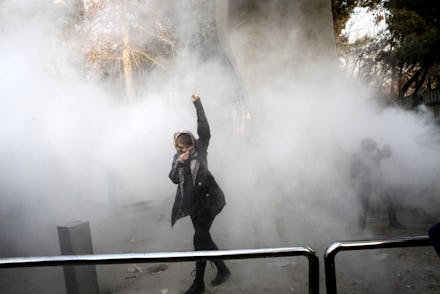Two demonstrators killed during ongoing anti-government protests in Iran

Iranian citizens are taking to the streets in anti-government protests that have led to the deaths of two protesters, the Associated Press reported.
The protests, which might be the largest in Iran since protests as a result of its 2009 presidential election, have been happening since Thursday throughout the country. The two protesters were killed in clashes that arose during an unauthorized protest Saturday night in the city of Doroud, authorities confirmed, the AP reported.
“The gathering was to be ended peacefully, but due to the presence of the (agitators), unfortunately, this happened,” said Habibollah Khojastehpour, the official deputy-governor of Lorestan province, according to the AP.
According to the Washington Post, Khojastehpour suggested the protesters were shot and killed by “foreign agents” or Sunni militants, noting that “no bullets were shot from police and security forces at the people.”
The Iranian government is ramping up their attempts to quash the rebellion. On Saturday, it blocked access to Telegram, a popular social media app in Iran that was being used to share footage of the protests.
Social media and “citizen journalism” are the primary way in which information is being shared about the protests, CNN reported, as Iran does not have freedom of speech and its media is controlled by the government.
Iranian officials also had harsh words for the country’s protesters, saying they will “pay the price” for their actions.
“Those who damage public property and create disorder are accountable before the law and must pay the price,” Interior Minister Abdolrahman Rahman Fazli said on state media in Iran, the Post reported.
President Donald Trump has been weighing in on the protests on Twitter, even though experts consider his comments on the situation to be “unhelpful,” according to CNN. On Sunday, Trump said the United States is “watching very closely for human rights violations” and noted the Iranian people “are finally getting wise as to how their money and wealth is being stolen and squandered on terrorism.”
The protests do have an economic motivation, as demonstrators rally against Iranian President Hassan Rouhani’s regime and the country’s economic shortcomings. According to the Washington Post, Iranians are angry after Rouhani failed to deliver on promises that the economy would improve following the Iran nuclear deal, which was expected to lift many international sanctions on the country.
In actuality, the Post reported, though the country’s GDP has grown thanks to increased oil exports, non-oil sector growth hasn’t increased as Rouhani promised. Inflation and the cost of food has risen, and CNN noted that there is now higher unemployment and a lack of international investment.
CNN also reported that hundreds of Iranian entities have not had their sanctions lifted as promised, leading citizens to become “disenchanted” by economic mismanagement and corruption.
“This is a very sensitive moment for Rouhani,” Alex Vatanka, an Iran expert at the Middle East Institute in Washington, told the Post. “Here’s a guy who basically came in to the presidency as someone who was going to be the champion of the reform cause in Iran. But these protests show that he’s not a champion of the people. And Iranians feel like they’ve been played.”
Radio Farda reported that some slogans brandished by protesters have also revealed broader anti-government sentiments against Rouhani’s regime and Supreme Leader Ayatollah Khamenei at play during the protests. Demonstrators are reportedly using such slogans as “Death to Khamenei,” “Khamenei, be ashamed and leave the country alone,” “death to the dictator” and “independence, freedom, Iranian republic,” according to Radio Farda.
“The government is viewed as highly corrupt, increasing inequality is seen by the population as really a form of injustice,” Alireza Nader, a senior international analyst and Iran researcher at the RAND Corporation in Washington, told CNN.
“This was supposed to be a system that delivered justice to the people after the revolution of 1979 and it has failed.”